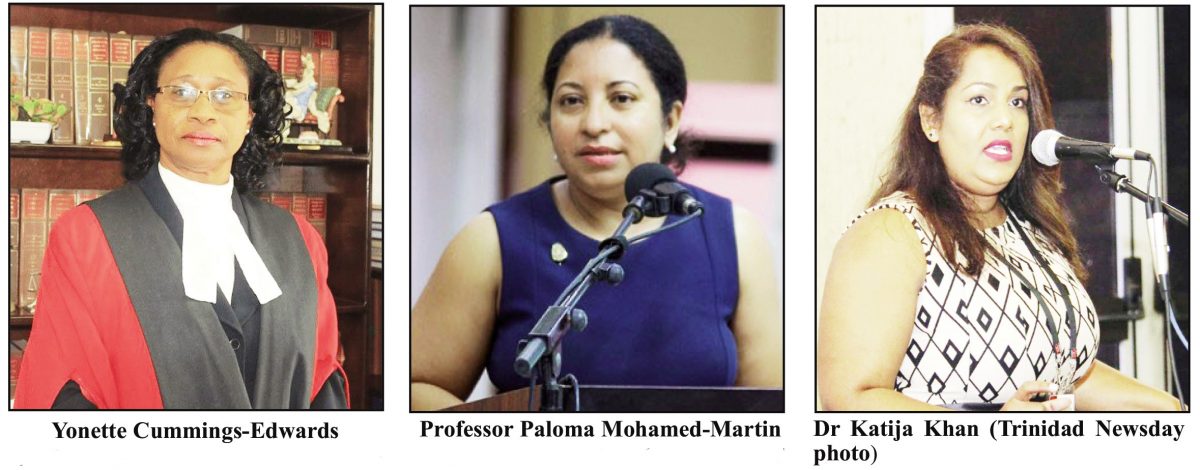The University of Guyana (UG) in collaboration with UNICEF and the Judiciary, on Monday launched the course—Understanding and Addressing Gender-Based Violence—which is aimed at being a practitioners’ guide for members of the legal profession in Guyana and the event heard how the COVID-19 pandemic has deepened the problem.
Vice-Chancellor, Professor Paloma Mohamed-Martin said that as part of the University’s efforts to arrest the scourge of Gender-Based Violence (GBV), plans are also in train for the launch of a course against domestic violence for the general public.
This, she said, will be launched on November 25th. She revealed, too, that a version of this course will be specially tailored for young people—teenagers— and school-aged children below the age of 12.
Delivering opening remarks at the virtual launch on Monday, acting Chancellor Yonette Cumming-Edwards described the initiative as a ground-breaking venture for the judiciary’s partnership with the University of Guyana.
Chancellor Cummings-Edwards said that one of the main challenges of addressing gender-based violence was found by the Courts to be a lack of specialized interventions.
It was against that background that she lauded the partnership with UG and UNICEF for the creation of an area of specialized intervention to deal with the issue of GBV here in Guyana.
Clinical Psychologist Dr. Katija Khan of the University of the West Indies, Trinidad and Tobago, by whom the course was taught said that the incidents of GBV and domestic violence (DV) have intensified since the onset of the COVID-19 pandemic.
Quite apart from being confronted by the ravaging effects of that global health crisis, Dr. Khan described GBV as a pandemic itself which she said had worsened with COVID-19 which brought with it lock-down restrictions which concomitantly saw many victims being locked in as well with their abusers.
She said that there has been an increased exposure to violence due to the social and economic impacts of COVID-19 which also saw many people losing their jobs.
An increase, she said, has also been seen in the risk of exposure of women to abusive partners; among other situations she highlighted humanitarian crises and displacement which she noted has also exacerbated non-partner sexual violence against women.
Dr. Khan said that while GBV is experienced by both men and women, the majority of the victims are reported to be women and girls.
She then shared what she noted to be a recent study on Guyana, Suriname, Trinidad and Tobago, Grenada and Jamaica which she said highlighted the prevalence of GBV. The Psychologist said that on average, at least 50% of woman in those countries experience at least one form of violence in their lifetime.
Regarding specific statistics for the lifetime prevalence of physical and sexual violence, she said it ranged from 38% in Guyana, 32% in Suriname, 30% in Trinidad and Tobago, 29% in Grenada and 28% in Jamaica.
She then shared that emotional violence was actually recorded as the most prevalent form of intimate partner violence, which she said accounted for 34% of women who had ever been in a relationship.
“So this problem is very prevalent in the Caribbean,” Dr. Khan stressed.
She noted that stereotyping GBV can also result in shifting the burden to victims and in so doing fail to hold offenders accountable for their actions.
She said it is against this background that stereotyping of GBV can impede access to legal rights and protections.
In her address, Chancellor Cummings-Edwards said that the Convention on the Elimination of all Forms of Violence and Discrimination against Women and the Convention on the Rights of the Child require state parties to take all appropriate legislative, administrative, social and educational measures to protect women and children from physical, mental and sexual violence.
She said that in recognition of this responsibility, Guyana has implemented various legislative measures aimed at protecting its citizens against gender-based violence. Noting, however, the persistence of GBV, the Chancellor said that apart from the laying of criminal charges, applications can also be made for protection orders.
Such applications she said, are given priority hearing.
Chancellor Cummings-Edwards said that the launch of the course was timely in the judiciary’s quest to fulfill its mandate of providing access to justice; even as she shared that up to Monday, all the magisterial districts across the country had a total of 3,298 cases.
She said, however, that about 3,000 of those cases had since been dispensed with.
Providing an overview of the topics of the course, Dr. Khan said it will address among other things; the social determinants of interpersonal violence and their impacts, an analysis of gender roles and the epidemiology of the various forms of GBV, victim and perpetrator behaviour and teen dating violence, myths and stereotypes about GBV and victims’ barriers to reporting violence, vicarious trauma and self-care and client-centred best practices and GBV and its relation to the law.
Delivering brief remarks, UNICEF Representative to Guyana and Suriname, Nicholas Charles Pron, commended the University and the Judiciary for partnering to promote what he said was greater awareness and use of evidence in supporting all sectors, in both the prevention and the response to GBV.
He offered “more open discussions, greater ownership and accountability and more capacity building,” in the continuing efforts to address the issues of GBV.





